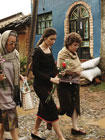
|
Revolución review
:. Director: Carlos Reygadas, Rodrigo Garcia, ...
:. Starring: Carlos Reygadas, Gael Garcia Bernal
:. Running Time: 1:45
:. Year: 2010
:. Country: Mexico
|
At its heart, Revolución is antirevolutionary. A new generation of Mexican filmmakers, many of whom have spent time in the U.S. and Los Angeles in particular, questions the gains of the Mexican Revolution as its centenary fast approaches. Stylistically and individually the ten shorts express anger, nostalgia and sadness at the hypocrisy and surrealism of the revolution as festivities are planned on both sides of the border. It is the antithesis of Paris Je T'Aime, a valentine of a film which lingered on the delights of the City of Lights.
The idea for Revolución came from Gael García Bernal and Diego Luna,'s production company Canana, and both contribute a short to the project, along with films from Fernando Eimbcke, Amat Escalante, Carlos Reygadas, Patricia Riggen, Rodrigo García, Rodrigo Pla, Mariana Chenillo and Gerardo Naranjo.
As an omnibus film featuring the who's who of a new generation of directors, the results are mixed. The opening short is Fernando Eimbcke's Waiting for Godot-esque rumination on about a tuba player in a small village who waits with his orchestra for a political delegation that never arrives. Carlos Reygadas' (Stellet Licht) short of a multilayered picnic filled with class tension and alcohol is surreal in its study of excess. .
Quiet moments of desperation accentuate the failures of the revolution. The exploitation of modern workers since revolutionary times is explored in Mariana Chenillo's bittersweet short about a female shop clerk who suffers from the same practices. Rodrigo Pla's short about the cynicism of modern Mexican politics is deeply felt in a few short moments in which Pancho Villa's son is manipulated into participating in a political rally commemorating the Mexican Revolution.
One of the weaker links is Patricia Riggen's short about an Angelena whose father passes away. She disguises his corpse and takes him to Mexico to be buried. While the scenes of returning to the village for the burial are moving, dressing up a dead body a la Weekend at Bernie's is tired and offensive. Diego Luna's short about a man at the beach whose family is breaking up doesn't directly deal with the revolution but does take somewhat superficial look at class differences.
Many of the shorts are in black and white, and the result at times is not knowing of the short takes place in 1910 or 2010. Amat Escalante's film about a priest rescued by a young boy and girl in the middle of a desert charred by war and atrocity is the most haunting. It is only when a McDonalds sign comes into focus at the end of their journey that you realize that this suffering refers to 2010.
Ironically, Revolución ends with Rodrigo Garcia's "7th and Alvarado", a short distance from where the film premiered at LA Live. Here we see two possibilities in this thoroughly Latino neighborhood of Los Angeles — it can be about immigrants who have not lost their ties to the revolution or it's about a revolution brimming in Los Angeles. I'd say it's the latter, as we watch a people clad in revolutionary garb and on horseback circle 7th and Alvarado.
Anji Milanovic

 Silent Light review Silent Light review
 Battle in Heaven review Battle in Heaven review
 Movie Reviews: Mexican Films Movie Reviews: Mexican Films
 Reviews 2012 - present Reviews 2012 - present
 Reviews 1998 - 2012 Reviews 1998 - 2012
|
|


